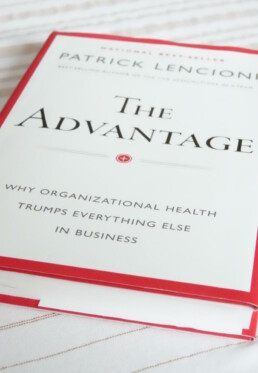The Advantage by Patrick Lencioni
Greatest Opportunity for Improvement
by Dima Shevchenko
In business, organizational health represents “…the greatest opportunity for improvement and competitive advantage.” Many miss out on substantial performance improvement by disregarding the discipline that Patrick Lencioni presents in his book, “The Advantage.”
Improving organizational health is far more important than a new strategy, a new way of efficiently cutting costs, implementing new technology, or finding a good location to place an ad. We live in an age when the world is oversaturated with accessible information. In competition with other organizations, being good is not enough. One must be excellent to stand out from others. Employers do everything possible to find the masters of their trade. Leaders spend resources to improve strategies, marketing, and finance. And yet, most find that this is barely enough to enter the competition. What can be done in the grind of competition? The simplicity of improving organizational health makes it seem a deceptively easy way to boost the performance of any organization.
What is Organizational Health?
Organizational health is integrity formed by the presence of a cohesive leadership team and clarity which makes the organization whole, consistent, and complete. Lencioni suggests that the idea of organizational health is best understood when the two basic qualities of a successful organization are contrasted: intelligence and health. Intelligence consists of strategy, marketing, finance, and technology. Health is easier to comprehend when one looks at the fruit of a healthy organization: minimal politics, minimal confusion, high morale, high productivity, and low turnover.
The Advantage: Organizational Health
The profitability of organizational health is real and pervasive, but difficult to measure because it is qualitative, not quantitative. It extends from the productivity of employees in the workplace to happiness in the employees’ personal lives. Unfortunately, health is often neglected. However, time spent for the sake of advancing health, also results in the development of intelligence. “Organizations where health is maintained inevitably grow smarter over time,” and “intelligence does not provide any inherent advantages for becoming healthy.”
How is Organizational Health Achieved?
Lencioni presents four disciplines:
- Build a cohesive leadership team. Embrace trust, conflict, commitment, accountability, and results.
- Create clarity. Answer 6 crucial questions about the organization:
- Why do we exist?
- How do we behave?
- What do we do?
- How will we succeed?
- What is important right now?
- Who must do what?
- Overcommunicate clarity. There is always room for communicating what is important. “Great leaders see themselves as Chief Reminding Officers as much as anything else.”
- Reinforce clarity. Make the environment of the organization fit the answers to the six questions.
- Replace bureaucracy with human systems
- Conduct meetings well
- Hire people that fit
Key Takeaway: Character
Something that stood out to me from the book is the importance of character. Performance is not only defined by what a person knows and how well they are able to execute their knowledge, but is also intertwined with virtue, love, power of will, determination, and other positive character qualities. It is just as important to develop character as it is to develop professional skills.
In conclusion, Lencioni draws the readers’ attention to the problem that most organizations have: many organizations are intelligent, few are healthy.

